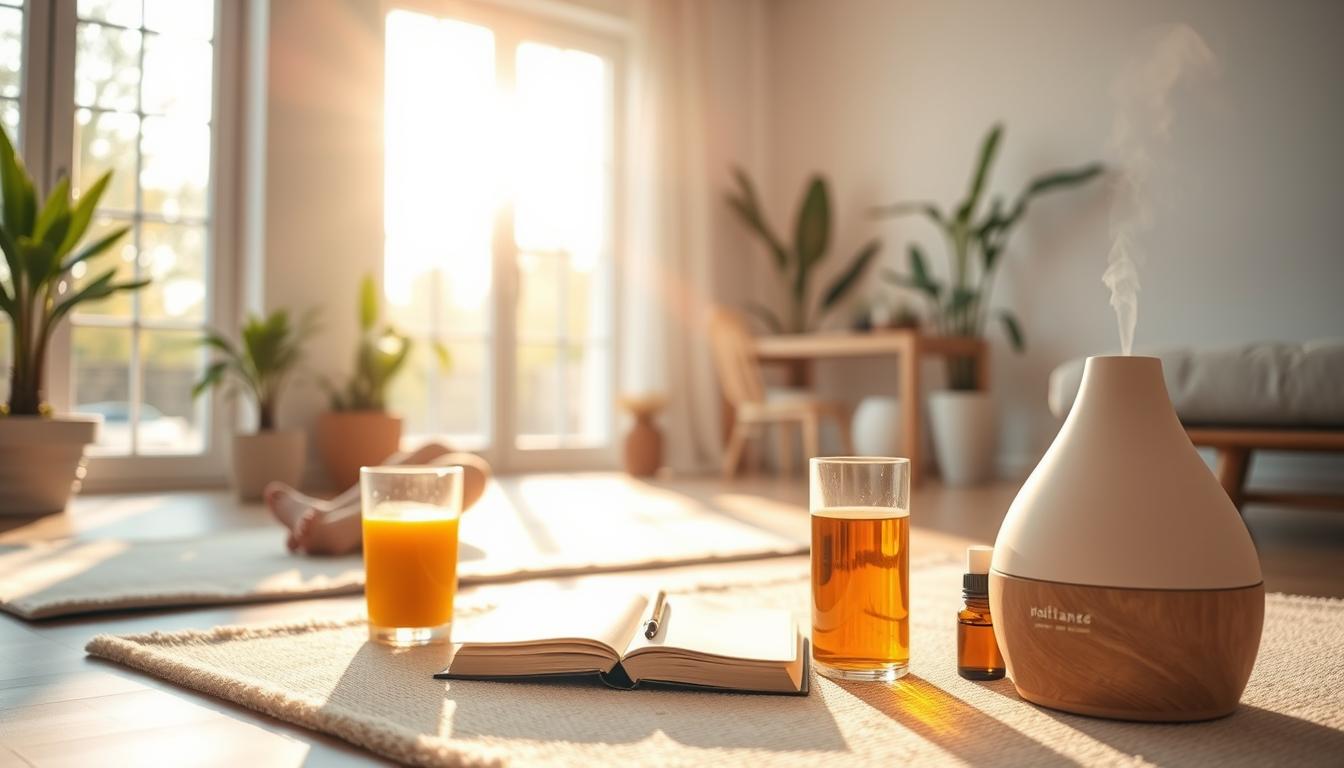Starting a daily wellness routine can really help us feel better. By adding simple habits to our everyday lives, we can get healthier and happier.
Imagine waking up feeling ready to go, full of energy and focus. This can happen if we pick healthy habits that help us live well. Let’s look at nine habits that can change your life for the better.
Key Takeaways
- Simple changes to your daily routine can improve overall well-being.
- Adopting healthy habits can increase energy and focus.
- A balanced lifestyle is key to mental and physical health.
- Small, consistent changes can lead to significant long-term benefits.
- Incorporating wellness practices into your daily life can be straightforward and rewarding.
Start Your Day with a Morning Routine
Creating a morning routine is key for better health. It’s not just tasks. It’s a way to start your day right.
A good morning routine boosts your mood and energy. It helps you feel ready for the day.
Benefits of a Structured Morning
A morning routine makes you more productive and less stressed. It helps you feel in control. You can do more in the morning and feel good all day.
Some benefits include:
- Improved mental clarity and focus
- Increased energy levels
- Enhanced creativity and problem-solving skills
- A sense of accomplishment and motivation
Easy Steps to Create Your Routine
Creating a morning routine is a personal journey. Think about what you want to achieve. Here are some steps to help you:
| Step | Description | Tips |
|---|---|---|
| 1. Set Your Goals | Identify what you want to achieve with your morning routine. | Be specific, measurable, and realistic. |
| 2. Assess Your Time | Determine how much time you have available in the morning. | Consider your wake-up time and other commitments. |
| 3. Prioritize Activities | Choose activities that align with your goals and preferences. | Include a mix of relaxation, exercise, and productivity. |
How to Stay Consistent
Keeping up with your routine can be hard. But, there are ways to stay on track. To keep your routine, remember to:
- Start small and gradually build up your routine
- Be flexible and adapt to changes in your schedule
- Track your progress and make adjustments as needed
- Make your routine enjoyable and rewarding
By following these tips, you can enjoy the benefits of a morning routine. It will help you succeed every day.
Hydrate with Plenty of Water Daily
Drinking lots of water is easy and very good for you. It’s a simple way to make your life better.
Water helps your body work right. It keeps you cool and moves nutrients and oxygen around. It also helps get rid of bad stuff.
Importance of Staying Hydrated
Being hydrated is key for your body and mind. Even a little dehydration can make you tired and hurt your head. Drinking enough water helps you perform better, digest food better, and have healthier skin.
Drinking water every day can make your life better. You should drink at least eight glasses a day. But, how much you need can change based on how active you are, where you live, and your health.
Tips for Increasing Water Intake
There are easy ways to drink more water. Here are some tips:
- Start your day with a glass of water.
- Carry a water bottle with you all day.
- Make your water taste better by adding fruits or herbs.
- Use a hydration app to keep track of how much you drink.
Signs of Dehydration to Watch For
Knowing when you’re dehydrated is important. Look out for these signs:
| Symptom | Description |
|---|---|
| Dark Urine | Urine that is dark yellow or amber-colored means you might be dehydrated. |
| Fatigue | Feeling very tired or slow. |
| Dry Mouth | A mouth and throat that feel dry and sticky. |
| Headaches | Dehydration can make headaches worse or cause them. |
By watching for these signs and drinking more water, you can stay healthy and feel good.
Prioritize Balanced Nutrition in Every Meal
To stay healthy, eat well every time. A good diet gives your body what it needs. This helps you feel better and stay away from sickness.
Building a Balanced Plate
Make your plate balanced by mixing food groups. Use the plate model to help. Fill half with veggies, a quarter with protein, and the last quarter with grains.
- Vegetables: Pick different colors for more nutrients.
- Lean Protein: Eat poultry, fish, beans, and lentils.
- Whole Grains: Go for brown rice, quinoa, and whole wheat.
Importance of Whole Foods
Whole foods are good for you because they’re natural. They help your body work better and feel more energetic. They also make your immune system strong.
Examples of whole foods are fruits, veggies, grains, lean proteins, and nuts.
Meal Prep Ideas for Success
Prep meals ahead to eat well. It saves time and helps you avoid throwing food away. Here are some ideas:
- Make overnight oats for the week.
- Roast veggies on the weekend for later use.
- Cook a lot of protein like chicken or lentils.
- Make a big salad for easy lunches.
Using these tips can help you stay healthy and happy for a long time.
Move Your Body with Regular Exercise
Regular exercise is key to a healthy life. It makes your body and mind better. It boosts your heart health, mood, and energy.
The World Health Organization says exercise is very important. It’s good for your body and mind. It helps with stress too.
Different Types of Exercise to Try
There are many exercises you can try. They match your likes and goals. Here are a few:
- Aerobic exercises, such as walking, running, or cycling, which improve cardiovascular health.
- Strength training exercises, like weightlifting, which help build muscle and boost metabolism.
- Flexibility exercises, including yoga or Pilates, which enhance flexibility and reduce the risk of injury.
Try different exercises to find what you like. It keeps your routine fun.
Finding the Right Workout for You
Finding a workout you like is key. Think about your goals, schedule, and what you like. For example, waking up early for a run might not work for everyone.
Here are some tips:
- Start with activities you enjoy, like dancing or swimming.
- Change your routine to stay interested and avoid getting stuck.
- Get help from fitness experts or videos.
Setting Realistic Fitness Goals
Setting goals you can reach is important. Start with small, achievable goals. Like exercising for 30 minutes, three times a week.
As you get better, you can do more. Celebrate your small wins. It keeps you going.
“You don’t have to be great to start, but you have to start to be great.” This quote shows starting is the first step.
Adding exercise to your daily life is a big step. It leads to a healthier, happier you.
Get Quality Sleep Each Night
Getting quality sleep is key for good health and happiness.
Benefits of Good Sleep Hygiene
Good sleep habits help you rest well. They include going to bed at the same time every night. Also, avoid caffeine and screens before bed. And, have a calm bedtime routine.
Benefits of good sleep hygiene include:
- Improved sleep quality
- Increased energy levels
- Better mental health and mood stability
- Enhanced cognitive function and productivity
Tips for Creating the Perfect Sleep Environment
Your sleep space is very important. To make it perfect, follow these tips:
- Keep your bedroom cool, dark, and quiet
- Invest in a comfortable mattress and pillows
- Use blackout curtains or an eye mask if necessary
- Avoid having TVs and computers in the bedroom
How to Manage Sleep Disruptors
Things like stress and screens can mess with your sleep. Here’s how to handle them:
| Disruptor | Management Strategy |
|---|---|
| Stress | Practice relaxation techniques like meditation or deep breathing |
| Electronic Devices | Avoid screens for at least an hour before bedtime |
| Certain Medications | Consult with your healthcare provider about adjusting your medication schedule |
By following these tips, you can sleep better. This will make you feel better every day.
Practice Mindfulness and Meditation
Practicing mindfulness and meditation can make you feel better in your mind and body. Adding these health-promoting habits to your day can help you handle stress better. It also makes your life feel more fulfilling.
The Science Behind Mindfulness
Mindfulness means being fully in the moment. Meditation helps you do this. Studies show it can make you feel less anxious and depressed. It also helps you sleep better and can lower your blood pressure.
Research says mindfulness changes your brain. It helps with paying attention and feeling emotions. This can make you think clearer and feel calmer.

Simple Meditation Techniques
Starting with easy meditation can make it feel more approachable. Try focusing on your breath. Notice how air moves in and out of your nose. If your mind drifts, gently bring it back to your breath.
Body scan meditation is another simple method. Lie down or sit comfortably. Focus on each part of your body, starting at your toes and moving up. Let go of any tightness as you go.
Incorporating Mindfulness into Your Day
You don’t need a lot of time for mindfulness. Small actions can be powerful. Eat slowly and enjoy your food. Notice the feeling in your feet as you walk. Or take a few deep breaths before a meeting.
| Mindfulness Activity | Benefits | Tips for Incorporation |
|---|---|---|
| Mindful Breathing | Reduces stress, improves focus | Take 5 minutes each morning to focus on your breath |
| Body Scan Meditation | Relaxes the body, reduces tension | Practice before bed to improve sleep quality |
| Mindful Eating | Improves digestion, enhances enjoyment of food | Eat slowly, pay attention to the taste and texture of your food |
By adding mindfulness and meditation to your daily life, you can live a healthier life. These healthy lifestyle practices help you stay strong and well over time.
Limit Screen Time and Social Media Use
Screens are everywhere in our lives. It’s key to know how they affect us. Too much screen time can harm our health, how we interact, and our work.
Effects of Excessive Screen Time
Too much screen time can hurt our eyes and make us feel tired. It can also mess up our sleep because of the blue light screens give off.
Too much social media can make us feel lonely, anxious, and sad. Seeing only the best parts of others’ lives can make us feel like we’re not good enough.
To avoid these problems, we need to set limits on our screen time. We can make some areas of our home screen-free, like the bedroom. We can also choose not to use screens during meals or before bed.
Strategies to Reduce Screen Time
There are easy ways to cut down on screen time. Using apps that track our screen use can help us see how much time we spend on screens. This can help us set goals to use screens less.
Another way is to find other things to do instead of screen time. Doing things like reading, exercising, or hobbies can make our lives better and reduce screen time.
Finding Alternatives for Entertainment
Looking for other ways to have fun can be fun itself. Going outside for walks, bike rides, or gardening is good for our health and cuts down on screen time.
Doing creative things like painting, writing, or playing music can be rewarding. These activities can make us think more, be creative, and feel proud of ourselves.
By trying these ideas, we can make our lives better by using screens less. This leads to a more balanced and happy life.
Foster Meaningful Connections and Relationships
Our social connections are key to a healthy life. They help us feel good emotionally and mentally. We’ll talk about why they matter, how to keep friendships strong, and finding time for ourselves.

Importance of Social Connections
Strong social ties are good for our health. People with many friends often have better health and feel happier.
Some key benefits of social connections include:
- Emotional support during tough times
- Feeling part of a community
- Better mental health
- Chances to grow and learn
Ways to Nurture Friendships
Keeping friendships alive takes work, but it’s worth it. Here’s how to do it:
- Regular Communication: Keep in touch with friends by calling, texting, or video chatting.
- Shared Activities: Do things you all like together.
- Support System: Help your friends when they need it.
Balancing Social Life and Personal Time
It’s important to balance being social and having alone time. Too much of either can be bad. We need both to feel good.
Tips for achieving a balance include:
- Make time for yourself and set boundaries
- Plan social events ahead of time
- Do things that make you happy alone
By making connections and relationships strong, we make our lives better. Adding these habits to our daily routine can really help us feel better.
Keep a Positive Mindset with Daily Affirmations
Daily affirmations are a simple way to stay positive. They can greatly improve your mental health and life quality.
The Power of Positive Thinking
Positive thinking is more than just being hopeful. It helps you deal with life’s tough times better. Studies show it lowers stress and anxiety.
Benefits of Positive Thinking:
- Improved mental health
- Enhanced resilience
- Better coping mechanisms
How to Create Effective Affirmations
To make good affirmations, say things that are positive, now, and about you. Say “I am confident” instead of “I will be.”
Tips for Effective Affirmations:
- Keep them short and concise
- Use present tense
- Focus on what you want, not what you don’t want
Incorporating Affirmations into Your Routine
Adding affirmations to your day is easy. Say them in the morning, write them in a journal, or set phone reminders.
| Method | Benefits |
|---|---|
| Morning Routine | Sets a positive tone for the day |
| Journaling | Enhances reflection and personal growth |
| Phone Reminders | Provides consistent reminders throughout the day |
Make daily affirmations a habit for a better mindset. Start simple and add them to your daily life.
Reflect and Plan for Continuous Growth
Adding health-promoting habits to your daily life is great. But, it’s also important to check your progress often. This keeps you on track and helps you make changes when needed.
Recording Your Journey
Daily journaling is a great way to reflect. It lets you track your experiences and see where you can get better. Writing down your thoughts and feelings helps you understand your habits better.
Achieving Your Objectives
Setting and checking your personal goals is key. It keeps you moving forward and motivated. By regularly looking at your goals, you can stay focused and make the right changes.
Envisioning Your Future
Having a clear vision for the future is important. It guides your actions and choices. A strong vision inspires you to adopt healthy habits and make good changes in your life.
FAQ
What are some simple ways to start incorporating healthy daily habits into my lifestyle?
Start by picking one or two habits you like, like drinking water or being mindful. Begin small. Then, slowly add more changes. Be patient as you create new habits for a healthy life.
How can I stay motivated to maintain my daily wellness routine?
Keep track of your progress and set goals. Reward yourself when you hit milestones. Having a supportive group or friend can also help keep you going.
What are some common obstacles to adopting healthy daily habits, and how can I overcome them?
Common hurdles include not having enough time, not feeling motivated, and old habits. To beat these, plan your new habits in your calendar. Make them fun. And don’t be too hard on yourself if you mess up. Building healthy habits takes time and effort.
How can I balance multiple healthy daily habits without feeling overwhelmed?
Focus on one or two habits at a time. Start with small changes and grow from there. Be flexible and adjust your habits as needed to keep a healthy balance.
Can healthy daily habits really make a significant difference in my overall health and wellbeing?
Yes, they can. Habits like exercise, eating right, and sleeping well can greatly improve your health. They lead to a happier and healthier life.
How long does it take to form a new healthy daily habit?
The time it takes to form a habit varies. It can take weeks to months for a habit to stick. Stay consistent and patient for lasting changes.




